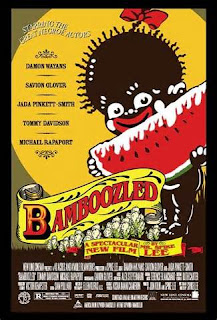Bamboozled
Getting back to the films of Spike Lee, I turn to Bamboozled, perhaps his most audacious film, one that shows just how precarious attempts at satire are. His point is certainly well-taken, but he overdoes it, laying it on so thick that it groans under its own weight. Lee also borrows heavily from Mel Brooks' The Producers and Sidney Lumet's Network, so much so that he uses verbatim the latter's famous "Stick out your head out the window" line.
Bamboozled is Lee's take on culturally insensitive material related to African-Americans through the ages. Damon Wayans, in an oddly mannered performance, plays a TV writer at a major network. His boss, the boorish Michael Rapaport, who tells Wayans that he is "blacker than you are" doesn't want safe shows like Cosby anymore. Wayans decides to call Rapaport's bluff, and proposes a minstrel show, complete with performers in blackface, tap-dancing, and set in a watermelon patch.
Wayans, it would seem but it isn't entirely clear, wants to go out in a blaze of glory. His assistant, Jada Pinkett-Smith, is resistant, but her motivation isn't clear, either. If she's not in on the gag, why doesn't she quit? They recruit two street performs (Savion Glover and Tommy Davidson), who uneasily take the money and look past the obvious.
Like The Producers, Wayans tries to lay it on thick to prove a point. In a scene very much like the one in which Zero Mostel and Gene Wilder look for their perfect Hitler, Wayans and Smith hold auditions to find their cast. They reject a radical rap group called the Maus Maus (one of them is Pinkett-Smith's brother, played by Mos Def). They will come back at the end of the story, much like the Ecumenical Liberation Network comes into play in Network.
To everyone's surprise, the minstrel show is a hit. Soon everyone is reciting lines, saying the "N" word, and even wearing blackface. Wayans surrounds himself with ephemera of the old days, such as Aunt Jemima dolls and "coon" artifacts (to be sure, many black people, such as Whoopi Goldberg, collect these items to either remind themselves of what happened or to gain a power over them).
The film tanked horribly, and looks like it was a small budget, with poor photography. The joke is pretty much over at the outset, and drags on much too long. The ending, as with Network, is violence, although Network managed to keep it's sense of black comedy, while Bamboozles abandons it and ends in a flourish of rhetoric. Lee, one of the leading spokesman for the black entertainment world (whether by his design or not) doesn't seem having to say beyond outrage, and ends the film with a montage of images from racist films and cartoons. But none of them date past the Civil Rights movement--even in 2000, when this film was released, almost everyone could agree that Amos and Andy was appalling.
Bamboozled is Lee's take on culturally insensitive material related to African-Americans through the ages. Damon Wayans, in an oddly mannered performance, plays a TV writer at a major network. His boss, the boorish Michael Rapaport, who tells Wayans that he is "blacker than you are" doesn't want safe shows like Cosby anymore. Wayans decides to call Rapaport's bluff, and proposes a minstrel show, complete with performers in blackface, tap-dancing, and set in a watermelon patch.
Wayans, it would seem but it isn't entirely clear, wants to go out in a blaze of glory. His assistant, Jada Pinkett-Smith, is resistant, but her motivation isn't clear, either. If she's not in on the gag, why doesn't she quit? They recruit two street performs (Savion Glover and Tommy Davidson), who uneasily take the money and look past the obvious.
Like The Producers, Wayans tries to lay it on thick to prove a point. In a scene very much like the one in which Zero Mostel and Gene Wilder look for their perfect Hitler, Wayans and Smith hold auditions to find their cast. They reject a radical rap group called the Maus Maus (one of them is Pinkett-Smith's brother, played by Mos Def). They will come back at the end of the story, much like the Ecumenical Liberation Network comes into play in Network.
To everyone's surprise, the minstrel show is a hit. Soon everyone is reciting lines, saying the "N" word, and even wearing blackface. Wayans surrounds himself with ephemera of the old days, such as Aunt Jemima dolls and "coon" artifacts (to be sure, many black people, such as Whoopi Goldberg, collect these items to either remind themselves of what happened or to gain a power over them).
The film tanked horribly, and looks like it was a small budget, with poor photography. The joke is pretty much over at the outset, and drags on much too long. The ending, as with Network, is violence, although Network managed to keep it's sense of black comedy, while Bamboozles abandons it and ends in a flourish of rhetoric. Lee, one of the leading spokesman for the black entertainment world (whether by his design or not) doesn't seem having to say beyond outrage, and ends the film with a montage of images from racist films and cartoons. But none of them date past the Civil Rights movement--even in 2000, when this film was released, almost everyone could agree that Amos and Andy was appalling.



Comments
Post a Comment